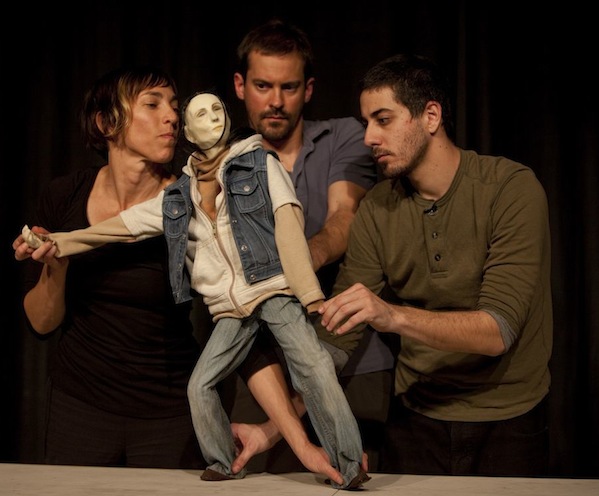Theater Preview: When Puppets Go Hungry
To take a page from Tolstoy, hunger is hunger but each hungry person experiences it in his or her own way. That insight is at the heart of the remarkable, socially engaged toy theater production Who’s Hungry.
Who’s Hungry – Santa Monica, at the Charlestown Working Theater, Charlestown, MA, October 3 through 5.
By Debra Cash
Recently Ron Shaich, the founder of Au Bon Pain and Panera Bread, spent a week living on Supplemental Nutrition Assistance Program (SNAP), otherwise known as food stamps. He limited his food budget to $4.50 a day, and as he told CNN “I really thought I understood the scope of the problem. But let me tell you something – I had no clue.” Shaich said he found himself “laser-focused on how much food was left in the fridge and how many dollars were left in my wallet. I was scared about eating portions that were too big, and wasn’t sure what to do if my food ran out.”
Shaich is a wealthy man who, before his SNAP week, had already expressed his concerns about food insecurity by creating five “community cafes” with no set prices and no cash registers, where diners pay what they will. (One opened at Boston’s Government Center.) He seems to have been completely sincere about his experiment in empathy. In some sense, his highly publicized trial couldn’t have come at a better time. On September 19, House Republicans voted to cut $40 billion from the food stamp program over the next 10 years and limit the time food stamp recipients can get benefits to three months. All this when the United States has close to the highest level of poverty in two decades – nearly 47 million people.
To take a page from Tolstoy, hunger is hunger but each hungry person experiences it in his or her own way. That insight is at the heart of the remarkable, socially engaged toy theater production Who’s Hungry – Santa Monica created by two guys named Dan: brilliant Rome Prize-winning puppeteer Dan Hurlin and playwright Dan Froot.
Their production (based on a series of shows about hunger in California communities) has been on a sweep of New England venues, sponsored by New England Foundation for the Arts’ Expeditions Program, and has already touched down at The Yard in Chilmark and at Wesleyan. This week it comes to The Charlestown Working Theater. Next spring Who’s Hungry – Santa Monica returns to the East coast with stops in North Adams, MA, New Canaan, Connecticut, and Portland, Maine.
“Who’s Hungry – Santa Monica” 4-minute excerpt from Dan Froot on Vimeo.
Who’s Hungry – Santa Monica portrays former interior designer Angel; recovering heroin addict Sharon; surfer dude Chris; Mike, who has been evicted from his rent-subsidized home; and Chanel, traumatized by 9-11. Based on hours of taped interviews – Froot’s working process is very similar to the documentary theater that generates Anna Deavere Smith’s celebrated monologues – each character is embodied in a visual aesthetic as distinct as the routes that led these men and women into food insecurity.
Staging these vignettes as a series of tabletop toy theater plays makes a theme that is often overwhelming and, by its very definition, invisible or easy to ignore, approachable and intimate. Who’s Hungry – Santa Monica takes place at a long dining table that stands between the puppeteers and the audience. While Froot and Hurlin’s work is carefully miniaturized the life stories of their subjects are never minimized; embodied in puppets and visual “objects” they resist being objectified.
Who’s Hungry? Way too many people. Maybe people you think you know.
Debra Cash has reported, taught and lectured on dance, performing arts, design and cultural policy for print, broadcast and internet media. She regularly presents pre-concert talks, writes program notes and moderates panels and events sponsored by World Music/CRASHarts, Wesleyan Center for the Arts and venues throughout New England. A former Boston Globe and WBUR dance critic, she received a 2012 Creative Arts Award from the Hadassah-Brandeis Institute for a new poetry project.
c 2013 Debra Cash
Tagged: Charlestown Working Theater, puppet theater, Puppets, toy theater, Who's Hungry

